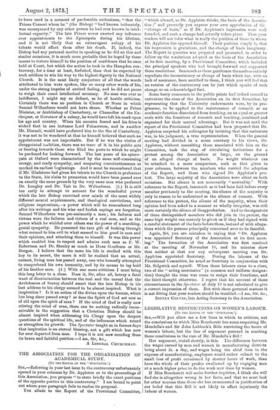THE ASSOCIATION FOR THE ORGANISATION OF ACADEMICAL STUDY.
[TO THE EDITOR OF THE " SPECTITOR.1
SIR,—Referring in your last issue to the controversy unfortunately opened in your columns by Dr. Appleton as to the proceedings of this Association, you propose " to state briefly the exact positions of the opposite parties to this controversy." I am bound to point out where your paragraph fails to realise its proposal.
You allude to the Report of the Provisional Committee, "which altered, as Dr. Appleton thinks, the basis of the Associa- tion ;" and presently you express your own approbation of thi "change of basis," as if Dr. Appleton's impression were well founded, and such a change had actually taken place. Thus your readers will not iufer what is really the position of those to whom Dr. Appleton has opposed himself. Their position simply is, that his impression is gratuitous, and the change of basis imaginary. The Report in question was prepared and presented, in order to follow up the resolutions adopted as the basis of the Association at its first meeting, by a Provisional Committee, which included the principal speakers who had brought forward and supported those resolutions. Inasmuch as these gentlemen themselves entirely repudiate the inconsistency or change of basis which has, with no lack of assurance, been ascribed to them, I think you will feel that no version of the controversy can be just which speaks of such change as an acknowledged fact.
Some hasty comments in the public prints had indeed seemed to caricature the aims of the Association on its first formation, by representing that the University endowments were, by its pro- gramme, to be applied to the maintenance of research as an academic function dissociated from teaching, on an equal or greater scale with the functions of research and teaching, combined and organised for their mutual advantage. But it was not until the report of the Provisional Committee had been prepared that Dr. Appleton surprised his colleagues by insisting that this caricature was, in his judgment, a true representation. When the general meeting had divided in a sense contrary to his views, Dr. Appleton, without consulting those associated with him on the Committee, took the step of circulating invitations for a protest among the Association at large, on the ground of an alleged change of basis. No weight whatever can be attached to a mere comparison, such as that given in your columns, between the numbers who carried the adoption of the Report, and those who signed Dr. Appleton's pro- test. The large majority of the Association were silent on both occasions. But silence is not necessarily "neutrality." 11'ith reference to the Report, inasmuch as it had been laid before every member previously to the meeting, the silence of the majority is only in reason to be understood as the silence of consent. With reference to the protest, the silence of the majority, when their opinion had been asked in a manner so wholly irregular, was still more certainly the silence of disapprobation. And to the signature of those distinguished members who did join in the protest, the same high weight can scarcely be given as if they had signed with a careful statement of the facts before them, instead of with allega- tions which the persons principally concerned aver to be fanciful.
Again, Sir, you are mistaken in saying that "Dr. Appleton was appointed Secretary of the Association at its first meet- ing." The formation of the Association was first resolved at the meeting of November 16, and its minutes show that neither at that nor any subsequent meeting was Dr. Appleton appointed Secretary. During the labours of the Provisional Committee, he acted as Secretary in conjunction with Mr. Sidgwick and myself. When those labours came to a close, two of the " acting secretaries" (a common and uniform designa- tion) thought the time was come to resign their functions, and the third thought otherwise. I regret that his account of these circumstances in the Spectator of July 19 is not calculated to give a correct impression of them. But with these personal matters it is not fitting that your readers should be troubled.—I am, Sir, &c., SIDNEY COLVIN, late Acting Secretary to the Association.






























 Previous page
Previous page